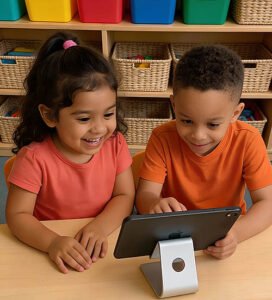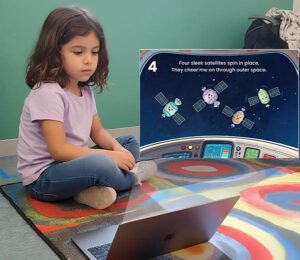Triangle Learning Community
We sit at the intersection of the student, the teacher, and artificial intelligence—forging a new future of learning
Our Work
Triangle Learning Community conducts research to explore how Artificial Intelligence and other technologies can be effectively integrated into the classroom, providing personalized learning opportunities, empowering and supporting teachers and students, and fostering accessibility to learning resources. Triangle Learning Community (TLC) begins its work with pre-K students, and then advances through K-12.
How We’re Different
Artificial Intelligence (AI) is a hot topic, but much of what we’ve seen so far in its applications in education focuses on tasks we already know how to do. AI is being used to generate content—schools already have an extensive curriculum in place. It’s also being employed to check students’ answers, provide alternative problems when they make mistakes, or move them back to earlier grade-level materials. Do we really need AI for more drill-and-practice exercises? The problem remains that the existing programs respond to wrong answers without knowing the reason for the error. TLC is responding to the cause, not the symptom.
Our Team
TLC unites leading educators, edtech developers and designers, and researchers to create next-generation learning resources. Our team includes pioneers who have successfully launched major education initiatives (such as America’s Choice and the Pearson System of Courses), as well as developers behind acclaimed academic and commercial learning applications. We also partner with researchers at the Education Development Center to ensure that our work reflects both the science of learning and the realities of classrooms, with special attention to privacy and child safety.
Personalization
The real challenge in education is providing personalized attention to students. In classrooms with one teacher for many students, personal time is limited. Imagine if AI could truly understand each student—their work, their interests, and their challenges. What if it could help them tackle complex problems, like word problems in math or reading comprehension in English Language Arts? Imagine an AI that doesn’t just check answers but analyzes a student’s thought process, identifying where their reasoning went off track.
Triangle Learning Community’s vision is a world in which students and teachers collaborate with digital AI-powered tools that are knowledgeable, trustworthy companions, supporting learners along their journey in meaningful ways.
A Vision of the Future
Triangle Learning Community’s vision is a world in which students and teachers collaborate with digital AI-powered tools that are knowledgeable, trustworthy companions, supporting learners along their journey in meaningful ways.

- Students will work with an AI-powered Companion that knows the student. It has memory—the history of all the student’s interactions—but, more importantly, it brings the relevant experience to bear at the right time.
- Because it knows the student’s actual work, it can provide constructive feedback based on what the student needs, not on what a trillion parameters of training data suggest is the best fit.

- The AI Companion asks appropriate questions. It knows when to zoom in or out, sometimes reflecting simply on where a student started or got stuck and other times honing in on a particular procedure. Because it digests and interprets a student’s work, it is a knowledgeable guide.

- The AI Companion builds on success, using what a student knows to effectively scaffold a deeper level of understanding in areas that are not as secure.
- It offers choice, suggesting tasks aligned to a student’s interest, all the while ensuring that those choices are coherent in supporting the learning journey.

- And, finally, it knows that it is not human. While it can support students working independently of a teacher or peers, it also knows that learning is most powerful when it occurs among living, breathing humans. Teachers are central to the learning process – AI should never replace them.
Research, Technology, Domain Experts and Users – A Powerful Collaboration
Is that possible? At the heart of Triangle Learning Community is a research mindset. TLC will continually probe key questions related to the application of AI to the processes of student learning as well as teaching. TLC will create value through an ongoing process of bench research which is designed to capture a wealth of learning science and teacher input, through to rapid prototyping with feedback, resulting in the scaling of those products that promise the most impact.